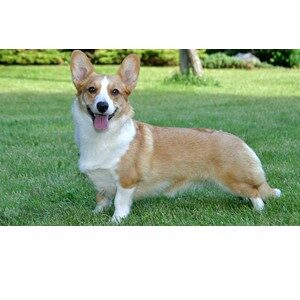Cardigan Welsh Corgi Dog Bed
Welsh Corgi’s Need A Memory Foam Bed!
Introduction
The Cardigan Welsh Corgi dog bed takes into account their health conditions, sleeping style, and preferences. Memory foam beds are best for health reasons.
The Cardigan Welsh Corgi is a charming and intelligent breed with a rich history and a big personality. Known for their long bodies, bushy tails, and distinctive ears, these dogs are among the oldest herding breeds, tracing their lineage back more than 1,000 years.
Brought to Wales by the Celts, Cardigans were originally used to herd cattle and guard farms, showcasing their versatility and work ethic. Today, they are cherished as loving family companions who are as loyal as they are playful.
Cardigans are often mistaken for their cousin, the Pembroke Welsh Corgi, but the two breeds have notable differences. Cardigans are slightly larger, have rounder ears, and retain their full tails, giving them a more fox-like appearance. While they share the Corgi’s iconic short legs, Cardigans boast a sturdier frame and an independent streak that reflects their history as a working breed.
Their intelligence and eagerness to please make them quick learners, but they also possess a stubborn side that requires consistent training. Cardigans thrive in homes where they are included in daily activities, as they form strong bonds with their families and dislike being left out.
Despite their small size, they are active dogs with moderate exercise needs and enjoy activities that challenge both their bodies and minds. Whether you’re looking for a loyal companion, an agile competitor in dog sports, or a cuddly yet protective family member, the Cardigan Welsh Corgi is a wonderful choice for those who can meet their unique needs.
In this guide, we share information about the Cardigan Welsh Corgi that many new owners may not know about. The topics include best bed types, brands, health conditions, behavior issues, tips for new owners, costs of ownership, and safe foods and foods to avoid.
Video: Pros and Cons
This is an excellent video sharing the pros and cons of the Cardigan Welsh Corgi dog breed. It is recommended to view this video prior to owning this dog.
Best Dog Bed Types
Here’s a list of the best dog bed types for Cardigan Welsh Corgis:
Orthopedic Beds
- Ideal for their long backs to prevent spinal strain.
- Look for memory foam options for joint and back support.
- CertiPUR-US Seal: Look for the CertiPUR-US seal when shopping for memory foam beds. It means that the materials used do not contain any toxins or chemicals that are harmful to pets and humans.
- Bolster Beds
- These beds provide head and neck support, which many Corgis enjoy.
- Ensure the bolsters are low enough for easy access.
- Donut Beds
- Great for Corgis who like to curl up.
- The raised edges create a sense of security.
- Cooling Beds
- Perfect for warm climates or if the Corgi tends to overheat.
- Look for gel-infused foam or breathable fabrics.
- Flat Cushion Beds
- Useful for crates or as a multi-purpose lounging spot.
- Easy to move around the house or use during travel.
- Waterproof Beds
- Ideal for puppies or older dogs prone to accidents.
- Ensure the cover is removable and washable.
- Elevated Beds
- Keeps them cool and off the floor, reducing exposure to dust.
- Good for outdoor use as well.
Top Dog Bed Brands
Here’s a list of reputable dog bed brands that consistently deliver high-quality products, suitable for Cardigan Welsh Corgis:
- FurHaven
- Known for a variety of orthopedic and plush beds, ideal for supporting Corgis’ long backs.
- Affordable options with machine-washable covers.
- PetFusion
- Offers premium orthopedic and memory foam beds.
- Durable materials with a focus on joint support and water resistance.
- BarksBar
- Specializes in bolster beds with orthopedic features.
- Comfortable and stylish designs with easy-to-clean covers.
- Best Friends by Sheri
- Popular for donut-style beds with a cozy, plush feel.
- Designed for dogs that like to burrow and curl up.
- K&H Pet Products
- Known for elevated and cooling beds as well as heated options for colder climates.
- Durable and easy-to-clean designs.
- Coolaroo
- Renowned for elevated pet beds made with breathable fabric.
- Great for indoor and outdoor use, especially in warmer climates.
- Brindle
- Focuses on memory foam beds with waterproof and washable covers.
- Perfect for dogs that need extra back and joint support.
- Kurgo
- Offers travel-friendly and waterproof beds, perfect for adventurous owners and their dogs.
- Lightweight and easy to carry.
- Hero Dog
- Affordable, high-quality crate pads and flat cushion beds.
- Durable and designed for easy cleaning.
- Orvis
-
- Premium brand offering stylish and durable beds with orthopedic support.
- Great for pet owners looking for high-end options.
Facts and Fun Facts of The Cardigan Welsh Corgi
Measurements:
- Size: Medium
- Group: Herding Group
- Height:5 – 12.5 inches
- Weight Male: 30 – 38 lbs.
- Weight Female: 25 – 34 lbs.
- Length: 36 – 43 inches
- Lifespan: 12 – 15 years
- Fully Grown: 2 years
- Colors: Black & White, Blue Merle & White, Brindle & White, Red & White, Sable & White
- Popularity: This breed is ranked the 63rd most popular in the United States by the American Kennel Club in 2023.
- Intelligence: This breed is ranked the 26th most intelligent by Stanley Coren.
Facts and Fun Facts
Here are 12 facts about Cardigan Welsh Corgis that new owners may not know: Ancient Lineage: The Cardigan Welsh Corgi came to Cardiganshire, Wales, with the Celts from Central Europe in around 1200 B.C. This makes them the older of the two Corgi breeds and also one of the earliest breeds in the British Isles.
- Ancient Lineage: The Cardigan Welsh Corgi came to Cardiganshire, Wales, with the Celts from Central Europe in around 1200 B.C. This makes them the older of the two Corgi Breeds and also one of the earliest breeds in the British Isles.
- Distinct from Pembrokes: Unlike Pembroke Welsh Corgis, Cardigans have a long tail and slightly larger, rounded ears. They are also slightly bigger and sturdier.
- Versatile Workers: Originally bred as herding dogs, they were also used as drovers to move cattle to market and even as guardians of the farm.
- Double Coat: Their weather-resistant double coat sheds heavily during certain seasons. Regular grooming is necessary to manage shedding.
- Highly Intelligent: Cardigans are quick learners and enjoy problem-solving, making them excellent at activities like obedience, agility, and herding trials.
- Family-Oriented: They are loyal and affectionate, forming strong bonds with their family members. They also tend to be good with children when properly socialized.
- Independent Streak: While they are eager to please, they can have an independent mind, requiring consistent training and positive reinforcement.
- Exercise Needs: Despite their short legs, Cardigans are energetic and need daily exercise to stay happy and healthy. Mental stimulation is equally important.
- Voiceful Communicators: They can be vocal, barking to alert their owners of anything unusual, which makes them good watchdogs.
- Their Name Means Dwarf Dog: The Corgi was named “cor” for dwarf (or perhaps “cur” for working dog) and “gi” for dog. Cardigan Welsh refers to their homeland.
- Health Awareness: They are generally healthy but can be prone to issues like intervertebral disc disease (IVDD) due to their long backs. Maintaining a healthy weight and avoiding excessive jumping is crucial.
- Adaptable Living: Cardigans can thrive in various living situations, from apartments to larger homes, as long as their physical and mental needs are met.
- They Have A Tail: Often called the “Corgi with a tail,” this breed’s tail is an easy way to distinguish the Cardigan from their Pembroke cousins.
- Their Ears Are Amazing: Not only are the Cardigan’s big ears adorable, but they are also extremely useful. Cardigan Welsh Corgis have incredibly acute hearing that can distinguish between familiar sounds and strange noises, making the breed a great watchdog. They also have used their hearing to roll out of the way from an approaching kick from a cow.
Fun Facts
Here are some fun facts about Cardigan Welsh Corgis:
- Mythical Origins: According to Welsh legend, fairies used Cardigan Welsh Corgis as warhorses and steeds, and you can supposedly see the “fairy saddle” markings on their backs.
- Natural Athletes: Despite their short stature, Cardigans are incredibly agile and excel at dog sports like agility, flyball, and rally obedience.
- Longer History than Pembrokes: Cardigans are the older of the two Corgi breeds, with a history predating Pembrokes by several centuries.
- Charming Tail Waggers: Their tails are not just functional; they add an extra dose of personality to this already expressive breed.
- Unique Gait: Cardigans have a distinctive, almost cat-like gait, which is efficient for long distances and herding.
- Nickname “The Yard Long Dog”: Due to their long bodies and short legs, some people jokingly refer to them as a “yard-long dog.”
- Chameleon-Like Color Changes: Puppies with merle coats often change slightly as they grow, with some spots or patterns becoming more defined or faded.
- Hoarding Tendencies: Cardigans are known to stash toys, bones, or even socks in their “secret spots,” which can lead to amusing discoveries.
- Sense of Humor: They’re playful and love entertaining their families, often acting like little clowns to make you laugh.
- Love for “Zoomies”: Like many herding breeds, they occasionally get bursts of energy, leading to hilarious “zoomies” around the house or yard.
- Movie Star Moment: A Cardigan Welsh Corgi was featured in the animated movie Strange Magic, adding to their media fame.
- Big Dog in a Small Body: Cardigans might be small, but they have a big personality and often think they’re just as large as any dog they meet!
Health Conditions
Here are the most common health conditions that can affect Cardigan Welsh Corgis:
- Intervertebral Disc Disease (IVDD): Due to their long backs, Cardigans are prone to spinal issues. Jumping off furniture or improper handling can exacerbate this condition.
- Hip Dysplasia: This genetic condition affects the hip joints, potentially leading to arthritis or mobility issues as the dog ages.
- Progressive Retinal Atrophy (PRA): A degenerative eye disorder that can lead to blindness over time. Regular eye exams are crucial.
- Degenerative Myelopathy (DM): A neurological condition that affects the spinal cord and causes gradual paralysis. Genetic testing can determine a dog’s risk.
- Obesity: Cardigans are prone to weight gain if overfed or under-exercised, which can worsen joint and back issues.
- Von Willebrand’s Disease (vWD): A blood clotting disorder that can lead to excessive bleeding. Testing is available to identify carriers.
- Cataracts: This condition clouds the lens of the eye, potentially impairing vision. Surgery is an option in severe cases.
- Hypothyroidism: Caused by an underactive thyroid gland, it can lead to weight gain, lethargy, and skin issues.
- Urinary Stones: Some Cardigans may develop bladder or kidney stones, leading to discomfort and urinary issues.
- Allergies: They can experience environmental or food-related allergies, causing skin irritation or digestive problems.
- Epilepsy: Some Cardigans may suffer from seizures, requiring lifelong management and medication.
- Patellar Luxation: A condition where the kneecap dislocates, which can cause pain or difficulty walking.
Regular vet check-ups, a balanced diet, proper exercise, and genetic testing when selecting a puppy can help manage or prevent these conditions.
Behavior Issues
Here are common behavior issues that new Cardigan Welsh Corgi owners should be aware of:
- Barking: Cardigans are naturally vocal and can bark excessively, especially if bored or trying to alert their owners to something unusual.
- Herding Instincts: They may nip at heels or attempt to herd people, pets, or children, which is rooted in their herding history.
- Stubbornness: While intelligent and eager to please, they can also have an independent streak, testing boundaries if training isn’t consistent.
- Resource Guarding: Some Cardigans may guard food, toys, or favorite spaces, displaying possessive behaviors.
- Separation Anxiety: They bond closely with their families and may become anxious or destructive when left alone for long periods.
- Chasing Behavior: Their herding instinct may make them prone to chasing moving objects like cars, bikes, or squirrels.
- Overexcitement: They can become overly excitable during play or new situations, which may lead to jumping or barking.
- Digging: Some Cardigans enjoy digging, especially if left unsupervised in a yard, as a way to entertain themselves.
- Chewing: Like many breeds, they may chew furniture or other items if not provided with appropriate chew toys or stimulation.
- Bossiness: Without clear leadership and boundaries, Cardigans may try to take control, becoming pushy or demanding.
- Distrust of Strangers: While not aggressive, they can be wary of new people or situations, leading to shyness or barking.
- Prey Drive: Their herding background may make them prone to chasing smaller animals, requiring early training to manage.
Training, socialization, and proper mental and physical stimulation are key to addressing and preventing these issues.
Tips for New Owners
Here are some tips for new Cardigan Welsh Corgi owners:
Training and Socialization
- Start Early: Begin training and socialization as soon as possible to curb unwanted behaviors like excessive barking or herding.
- Positive Reinforcement: Use treats, praise, and play to encourage good behavior, as Cardigans respond well to positive methods.
- Teach “Quiet” Command: Help manage their tendency to bark by training them to stop on cue.
- Redirect Herding: Offer appropriate outlets like herding balls or structured games to satisfy their natural instincts.
- Leash Training: Practice leash manners early to prevent pulling or chasing during walks.
Exercise and Enrichment
- Daily Exercise: Provide at least 30–60 minutes of exercise daily, including walks, playtime, or dog sports like agility or obedience.
- Mental Stimulation: Use puzzle toys, training games, and scent work to keep their intelligent minds engaged.
- Avoid Jumping: Minimize activities that strain their backs, such as jumping off furniture or stairs. Use ramps if necessary.
Health and Grooming
- Regular Grooming: Brush their double coat weekly to manage shedding and keep their skin healthy.
- Weight Management: Monitor their diet carefully to prevent obesity, which can worsen back and joint issues.
- Vet Check-Ups: Schedule routine vet visits to screen for common health conditions like IVDD or PRA.
Social and Emotional Needs
- Family Interaction: Cardigans thrive on attention and love being part of family activities. Include them in your daily life.
- Crate Training: Provide a safe, comfortable space where they can relax and feel secure when you’re not home.
- Alone Time Training: Gradually teach them to be comfortable being alone to prevent separation anxiety.
General Care
- Secure Yard: Ensure your yard is secure, as their curiosity and herding instincts may lead them to wander.
- Early Introductions: Expose them to a variety of people, places, and situations to build their confidence and reduce wariness.
- Chew Toys: Provide durable chew toys to satisfy their natural chewing instincts and protect your belongings.
Costs of Ownership
Here’s a breakdown of the typical costs of owning a Cardigan Welsh Corgi:
Initial Costs
- Purchase or Adoption Fee:
- From a reputable breeder: $1,200–$2,500 (depending on lineage and location).
- Adoption: $150–$500 (rescue organizations or shelters).
- Initial Veterinary Care:
- Vaccinations, spaying/neutering, microchipping, and health exams: $300–$600.
- Supplies:
- Crate: $50–$150.
- Bed: $30–$100.
- Food and water bowls: $10–$50.
- Leash, collar, and harness: $30–$60.
- Toys and chews: $20–$50 to start.
- Grooming tools (brush, nail clippers, shampoo): $30–$100.
Recurring Costs
- Food:
- High-quality dog food: $30–$60 per month ($360–$720 annually).
- Routine Veterinary Care:
- Annual check-ups, vaccines, and preventive medications (flea/tick, heartworm): $300–$500 annually.
- Grooming:
- Basic grooming supplies are often sufficient, but professional grooming (if needed): $40–$80 per session.
- Training Classes:
- Puppy or obedience classes: $100–$300 for a multi-week course.
- Pet Insurance:
- $20–$50 per month ($240–$600 annually), depending on the plan and coverage.
- Miscellaneous Supplies:
- Replacing worn-out items like toys, beds, or leashes: $50–$100 annually.
Other Potential Costs
- Unexpected Veterinary Bills:
- Emergency care or treatment for health conditions like IVDD or hip dysplasia can cost $1,000–$5,000 or more.
- Consider setting aside savings or purchasing pet insurance to help cover these costs.
- Boarding or Pet Sitting:
- $20–$50 per day for boarding or $15–$30 per visit for a sitter.
- Dog Sports or Activities:
- Participation in activities like agility or herding trials may involve entry fees, equipment, or specialized training: $100–$500 annually.
First-Year Estimate
Initial setup and recurring costs typically range between $1,500 and $4,000, depending on your choices and circumstances. Annual Costs After the First Year Expect to spend around $800–$2,000 annually on food, vet care, grooming, and other expenses. Here’s a list of safe foods and foods to avoid for Cardigan Welsh Corgis:
Safe Foods
These can be given in moderation and prepared appropriately (no seasoning, raw meats cooked, etc.):
- Proteins:
- Cooked lean meats: chicken, turkey, beef, lamb.
- Cooked eggs (no butter or oil).
- Plain cooked fish like salmon (boneless).
- Fruits (in small amounts):
- Apples (no seeds).
- Blueberries.
- Strawberries.
- Watermelon (seedless).
- Bananas.
- Vegetables:
- Carrots (raw or cooked).
- Green beans.
- Sweet potatoes (cooked, no skin).
- Broccoli (small amounts).
- Zucchini.
- Grains:
- Plain cooked rice or oatmeal.
- Whole-grain bread (small amounts).
- Dairy:
- Plain, unsweetened yogurt (in small quantities).
- Small pieces of cheese (low-fat).
- Healthy Fats:
- Small amounts of peanut butter (unsalted, no xylitol).
- Coconut oil (sparingly).
Foods to Avoid
These foods are toxic or dangerous and should never be given:
- Toxic Foods:
- Chocolate: Contains theobromine, which is toxic to dogs.
- Grapes and Raisins: Can cause kidney failure.
- Onions, Garlic, and Chives: Can damage red blood cells.
- Avocado: Contains persin, toxic in large amounts.
- Artificial Sweeteners:
- Xylitol: Found in sugar-free gum and candy, it can cause severe hypoglycemia and liver failure.
- Fatty or Fried Foods:
- Can lead to pancreatitis.
- Bones:
- Cooked bones can splinter and cause choking or internal damage.
- Raw Dough:
- Yeast can expand in their stomach and cause bloating.
- Alcohol:
- Even small amounts are toxic to dogs.
- Caffeine:
- Found in coffee, tea, and energy drinks, it can cause restlessness, rapid breathing, and heart issues.
- Nuts:
- Macadamia Nuts: Extremely toxic to dogs.
- Other nuts like walnuts and pecans can cause digestive upset or choking hazards.
- Salty Snacks:
- High salt intake can lead to dehydration or sodium ion poisoning.
- Dairy in Excess:
- While small amounts of cheese or yogurt are okay, large quantities can cause digestive issues due to lactose intolerance.
- Raw Eggs or Meat:
- May carry salmonella or other bacteria unless safely prepared.
- Spicy or Seasoned Foods:
- Can cause stomach irritation and discomfort.
Conclusion
Owning a Cardigan Welsh Corgi is a rewarding experience, filled with moments of joy, laughter, and companionship. These versatile dogs are more than just adorable; they are intelligent, loyal, and packed with personality.
However, like any breed, they come with specific needs and challenges that new owners should be prepared to address. From their herding instincts to their strong vocal tendencies, Cardigans are dogs that thrive in an environment where they feel mentally and physically engaged.
Regular exercise, combined with activities that challenge their intelligence, such as obedience training or puzzle toys, is essential to keep them happy and prevent boredom.
Socialization and consistent training from an early age can help curb undesirable behaviors, such as excessive barking or herding tendencies, ensuring they grow into well-rounded adults.
Their affectionate and family-oriented nature makes them a great choice for households with children, but supervision is essential to ensure harmonious interactions. Cardigans also have a strong protective instinct, which, when properly managed, can make them excellent watchdogs without becoming overly territorial.
Regular grooming, a healthy diet, and routine vet visits will help ensure your Corgi remains in top health, while activities like dog sports can further strengthen your bond.
While their stubborn streak and vocal nature may present occasional challenges, these traits are far outweighed by their loyalty, intelligence, and loving disposition. Cardigans have an uncanny ability to sense their owners’ moods, often acting as a source of comfort and support.
With their expressive faces and playful antics, they bring endless joy to those lucky enough to call them family.
In the end, the Cardigan Welsh Corgi is more than just a pet; they are a devoted companion who will enrich your life in countless ways. By understanding their needs and providing a nurturing environment, you’ll discover the full extent of what makes this breed so special.
For those ready to invest time, love, and effort, a Cardigan Welsh Corgi can be a lifelong friend and an irreplaceable member of the family.
Check out our article on the most popular dog breeds in the United States by clicking on the link.
Shop Dog Beds
Shop dog beds for your dog by selecting or clicking on any bed of choice. You will be taken to Amazon where you can read customer reviews and answered questions and place the order. As an Amazon Associate, I earn from qualifying purchases. Your purchase price is the same as if you shop directly on Amazon. The price at time of publish is included below to give you an idea of what the price is; however, it is subject to change.
Cooling Gel Dog Beds
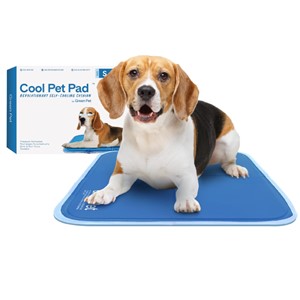
The Green Pet Shop Cooling Mat
Price At Time of Publish $40.00
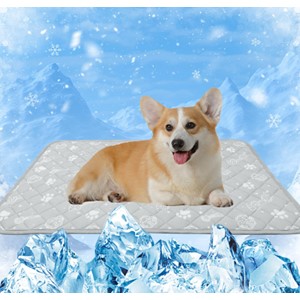
MH MYLUNE HOME Self Cooling Mat
Price At Time of Publish $40.00
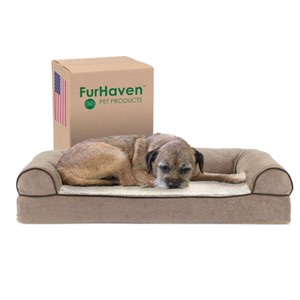
Furhaven Pet Products Cooling Gel Bolsters Small Bed
Price At Time of Publish $45.00
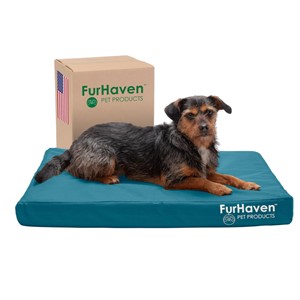
Furhaven Cooling Gel Medium Bed
Price At Time of Publish $42.00

ARF Pets Cooling Gel Pad
Price At Time of Publish $35.00
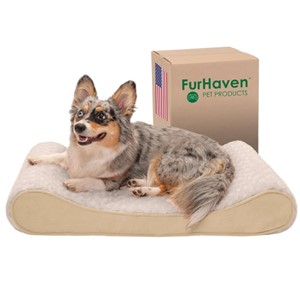
Furhaven Cooling Gel Small Bed
Price At Time of Publish $50.00
Price At Time of Publish $50.00
Orthopedic Dog Beds
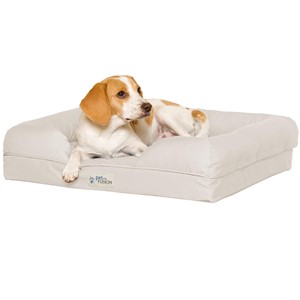
PetFusion Orthopedic Dod Bed
Price At Time of Publish $80.00
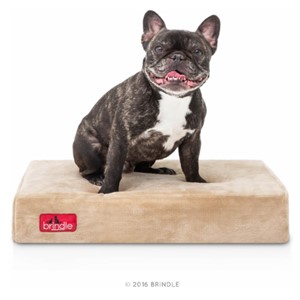
Brindle Orthopedic Bed Khaki
Price At Time of Publish $30.00
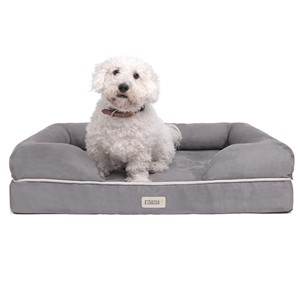
Friends Forever Orthopedic Bolster Bed
Price At Time of Publish $53.00
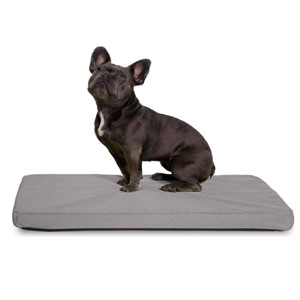
K9 Ballistics Tough Orthopedic Small Crate Bed
Price At Time of Publish $89.00
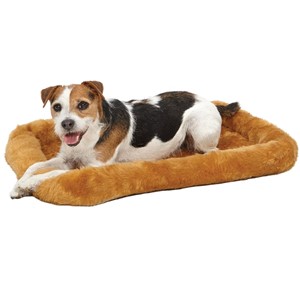
MidWest Homes Small Bolster Dog Bed
Price At Time of Publish $10.00
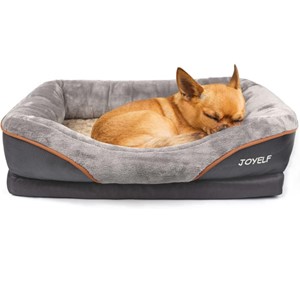
JOYELF Orthopedic Small Sofa Bed
Price At Time of Publish $40.00
Bolster Dog Beds
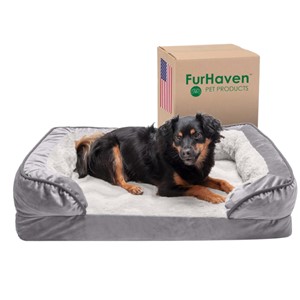
Furhaven Small-Medium Bolster Dog Bed
Price At Time of Publish $57.00
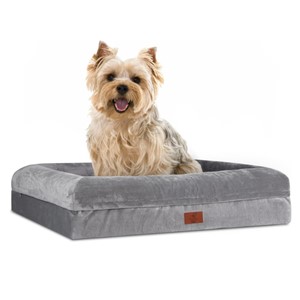
Yiruka Small Bolster Sofa Dog Bed
Price At Time of Publish $40.00
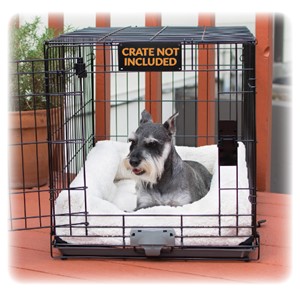
K&H Pet Products Bolster Crate Pad
Price At Time of Publish $22.00
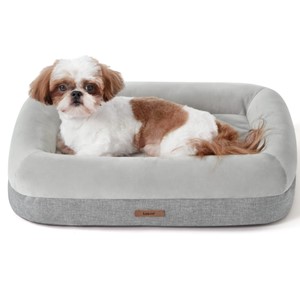
Leasure Small Bolster Dog Bed
Price At Time of Publish $40.00
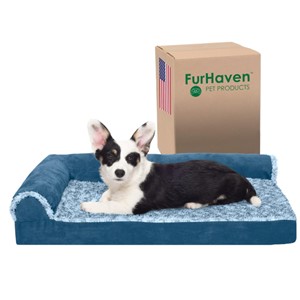
Furhaven Small-Medium L-Shaped Bed
Price At Time of Publish $39.00
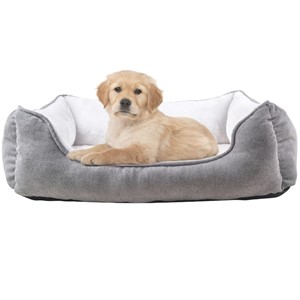
Long Rich Bolster Small Bed
Price At Time of Publish $27.00
Elevated Dog Beds
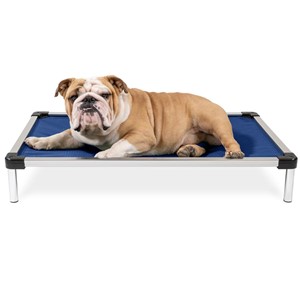
K9 Ballistics Chew Proof Elevated Small Bed
Price At Time of Publish $129.00
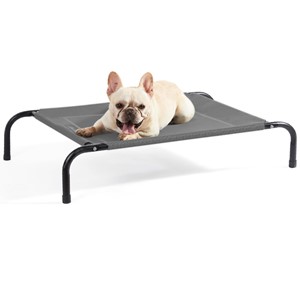
Bedsure Medium Elevated Dog Bed
Price At Time of Publish $33.00
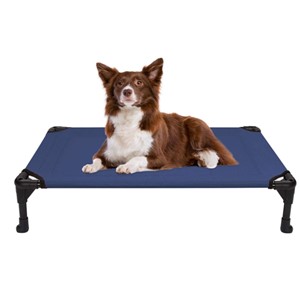
Veehoo Medium Elevated Dog Bed
Price At Time of Publish $45.00
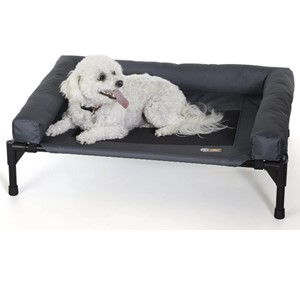
K&H Pet Products Elevated Bolster Dog Bed
Price At Time of Publish $57.00
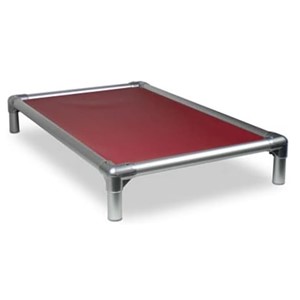
Kuranda Elevated Chew Proof Small Dog Bed
Price At Time of Publish $134.00
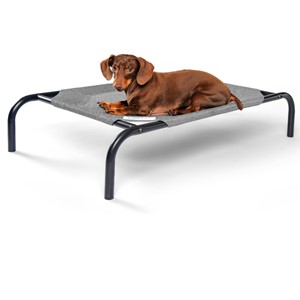
Coolaroo Small Elevated Dog Bed
Price At Time of Publish $21.00
Shop Cave/Donut Dog Beds
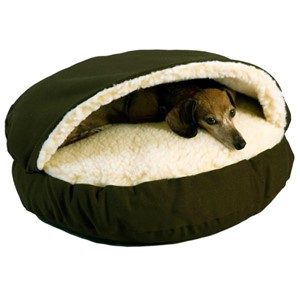
Snoozer Cozy Cave Bed
Price At Time of Publish $87.00
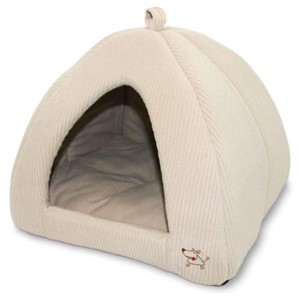
Best Pet Supplies Tent Bed
Price At Time of Publish $23.00
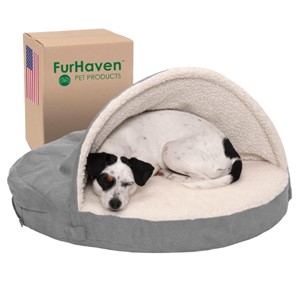
Furhaven Round Orthopedic Cave Bed
Price At Time of Publish $30.00
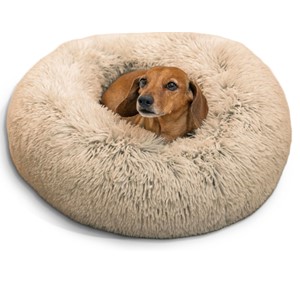
Best Friends by Sheri Original Calming Donut Bed
Price At Time of Publish $25.00
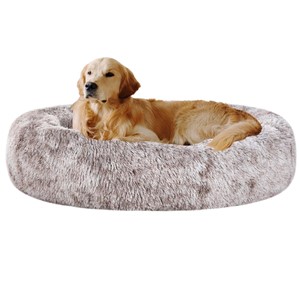
Coohom Oval Calming Donut Cuddler Bed
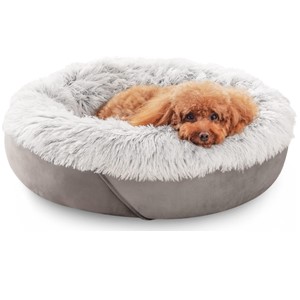
JOEJOY Calming Donut Small Dog Bed
Price At Time of Publish $33.00
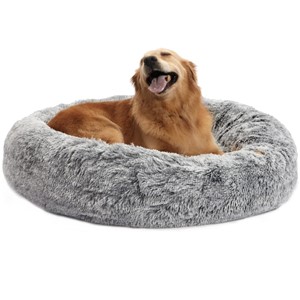
Bedfolks Calming Donut Dog Bed
Price At Time of Publish $66.00
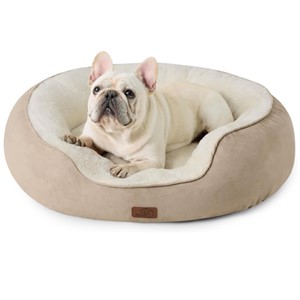
Bedsure Medium Donut Dog Bed
Price At Time of Publish $36.00

Bedsure Medium Donut Dog Bed
Price At Time of Publish $40.00
Related Articles
Below are some other articles you may be interested in reading. Just select on the topic of interest to learn more about it.
Go back to the Dog Luxury Beds home page.
